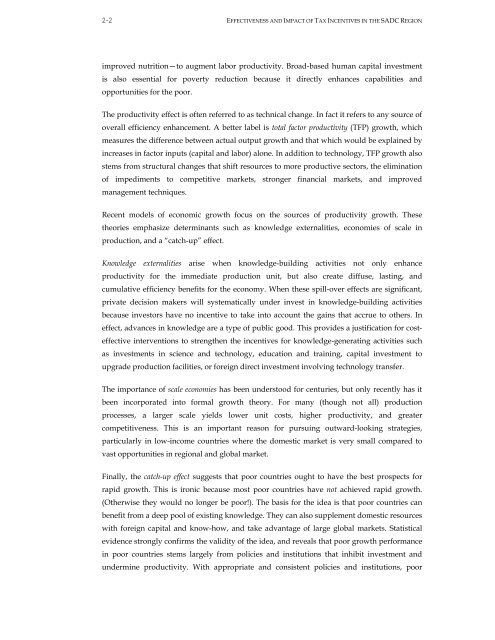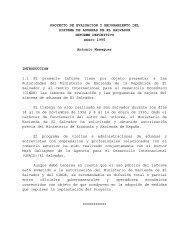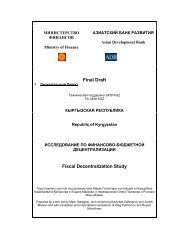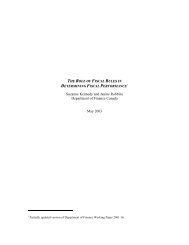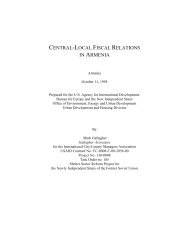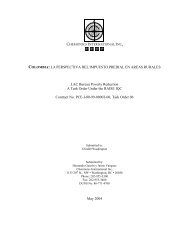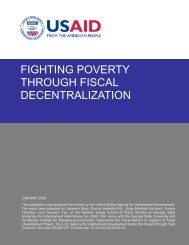Effectiveness and Economic Impact of Tax Incentives in the SADC ...
Effectiveness and Economic Impact of Tax Incentives in the SADC ...
Effectiveness and Economic Impact of Tax Incentives in the SADC ...
You also want an ePaper? Increase the reach of your titles
YUMPU automatically turns print PDFs into web optimized ePapers that Google loves.
2-2 EFFECTIVENESS AND IMPACT OF TAX INCENTIVES IN THE <strong>SADC</strong> REGION<br />
improved nutrition—to augment labor productivity. Broad-based human capital <strong>in</strong>vestment<br />
is also essential for poverty reduction because it directly enhances capabilities <strong>and</strong><br />
opportunities for <strong>the</strong> poor.<br />
The productivity effect is <strong>of</strong>ten referred to as technical change. In fact it refers to any source <strong>of</strong><br />
overall efficiency enhancement. A better label is total factor productivity (TFP) growth, which<br />
measures <strong>the</strong> difference between actual output growth <strong>and</strong> that which would be expla<strong>in</strong>ed by<br />
<strong>in</strong>creases <strong>in</strong> factor <strong>in</strong>puts (capital <strong>and</strong> labor) alone. In addition to technology, TFP growth also<br />
stems from structural changes that shift resources to more productive sectors, <strong>the</strong> elim<strong>in</strong>ation<br />
<strong>of</strong> impediments to competitive markets, stronger f<strong>in</strong>ancial markets, <strong>and</strong> improved<br />
management techniques.<br />
Recent models <strong>of</strong> economic growth focus on <strong>the</strong> sources <strong>of</strong> productivity growth. These<br />
<strong>the</strong>ories emphasize determ<strong>in</strong>ants such as knowledge externalities, economies <strong>of</strong> scale <strong>in</strong><br />
production, <strong>and</strong> a “catch-up” effect.<br />
Knowledge externalities arise when knowledge-build<strong>in</strong>g activities not only enhance<br />
productivity for <strong>the</strong> immediate production unit, but also create diffuse, last<strong>in</strong>g, <strong>and</strong><br />
cumulative efficiency benefits for <strong>the</strong> economy. When <strong>the</strong>se spill-over effects are significant,<br />
private decision makers will systematically under <strong>in</strong>vest <strong>in</strong> knowledge-build<strong>in</strong>g activities<br />
because <strong>in</strong>vestors have no <strong>in</strong>centive to take <strong>in</strong>to account <strong>the</strong> ga<strong>in</strong>s that accrue to o<strong>the</strong>rs. In<br />
effect, advances <strong>in</strong> knowledge are a type <strong>of</strong> public good. This provides a justification for cost-<br />
effective <strong>in</strong>terventions to streng<strong>the</strong>n <strong>the</strong> <strong>in</strong>centives for knowledge-generat<strong>in</strong>g activities such<br />
as <strong>in</strong>vestments <strong>in</strong> science <strong>and</strong> technology, education <strong>and</strong> tra<strong>in</strong><strong>in</strong>g, capital <strong>in</strong>vestment to<br />
upgrade production facilities, or foreign direct <strong>in</strong>vestment <strong>in</strong>volv<strong>in</strong>g technology transfer.<br />
The importance <strong>of</strong> scale economies has been understood for centuries, but only recently has it<br />
been <strong>in</strong>corporated <strong>in</strong>to formal growth <strong>the</strong>ory. For many (though not all) production<br />
processes, a larger scale yields lower unit costs, higher productivity, <strong>and</strong> greater<br />
competitiveness. This is an important reason for pursu<strong>in</strong>g outward-look<strong>in</strong>g strategies,<br />
particularly <strong>in</strong> low-<strong>in</strong>come countries where <strong>the</strong> domestic market is very small compared to<br />
vast opportunities <strong>in</strong> regional <strong>and</strong> global market.<br />
F<strong>in</strong>ally, <strong>the</strong> catch-up effect suggests that poor countries ought to have <strong>the</strong> best prospects for<br />
rapid growth. This is ironic because most poor countries have not achieved rapid growth.<br />
(O<strong>the</strong>rwise <strong>the</strong>y would no longer be poor!). The basis for <strong>the</strong> idea is that poor countries can<br />
benefit from a deep pool <strong>of</strong> exist<strong>in</strong>g knowledge. They can also supplement domestic resources<br />
with foreign capital <strong>and</strong> know-how, <strong>and</strong> take advantage <strong>of</strong> large global markets. Statistical<br />
evidence strongly confirms <strong>the</strong> validity <strong>of</strong> <strong>the</strong> idea, <strong>and</strong> reveals that poor growth performance<br />
<strong>in</strong> poor countries stems largely from policies <strong>and</strong> <strong>in</strong>stitutions that <strong>in</strong>hibit <strong>in</strong>vestment <strong>and</strong><br />
underm<strong>in</strong>e productivity. With appropriate <strong>and</strong> consistent policies <strong>and</strong> <strong>in</strong>stitutions, poor


